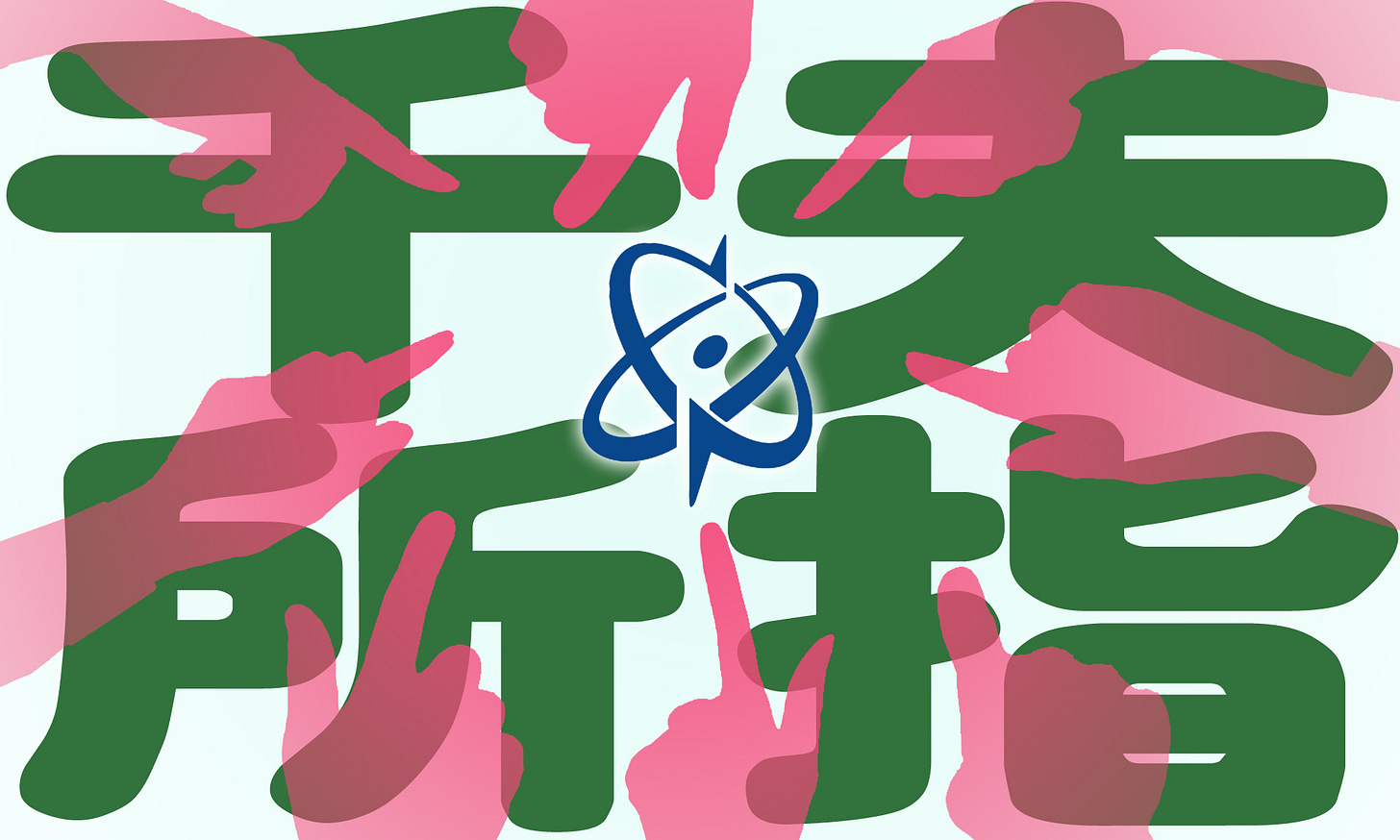"Under fire from all sides" — Phrase of the Week
1.2 million applications for 8,000 roles in state-owned firm sparks backlash over China’s job market

Our phrase of the week is: "under fire from all sides" (千夫所指 qiān fū suǒ zhǐ)
Context
China National Nuclear Corporation (CNNC, 中核集团), one of China’s largest state-owned enterprises (SOEs), found itself at the centre of online backlash after publishing a blog post on April 6.
The post was about the outcome of company’s spring hiring campaign:
“We received 1,196,273 résumés!”
我们共收到1,196,273份简历!
wǒmen gòng shōu dào yì bǎi yī shí jiǔ wàn liù qiān èr bǎi qī shí sān fèn jiǎnlì!
According to their marketing materials, the company received nearly 1.2 million applications for just 1,730 positions, which was part of a broader recruitment drive offering 8,000 roles across the group.
From the company’s perspective, these figures were a mark of success—proof of their strong reputation and appeal as an employer. However, the failure of CNNC’s marketing team to empathise with job seekers led their WeChat update to quickly spiral into a public relations headache.
Online, some netizens sarcastically referred to the post as the company sharing a “congratulatory announcement” (喜报)—an official-sounding term usually reserved for celebrating good news, like winning a major contract or exceeding performance targets, not highlighting the harsh reality facing millions of young job seekers.
The intense backlash led CNNC to follow a common SOE crisis communications playbook: quickly delete the post, replace it with a toned-down version, and forget the original post ever existed.
But the damage was done as one widely shared social media comment puts it:
“Yesterday’s post on CNNC’s official WeChat account was meant to show off.
Instead, it backfired spectacularly and made them the target under fire from all sides.”
中核集团昨天本来只是想在自家公众号上炫耀一番,却不小心翻车了,成为舆论场上千夫所指的对象。
Zhōnghé Jítuán zuótiān běnlái zhǐshì xiǎng zài zìjiā gōngzhòng hào shang xuànyào yì fān, què bù xiǎoxīn fānchē le, chéngwéi yúlùn chǎng shang qiān fū suǒ zhǐ de duìxiàng.
And with that, we have our Sinica Phrase of the Week!
What it means
"Under fire from all sides" (千夫所指 qiān fū suǒ zhǐ) is an idiom which originates from the Book of Han (汉书), also translated as the Han Shu, written by Ban Gu (班固) in the 1st century CE. The Han Shu chronicles the Western Han dynasty (206 BCE – 9 CE) and is considered one of China’s most important official histories.
The idiom appears in the section, Biography of Wang Jia (王嘉传), who was a high-ranking official during the Western Han known for his moral integrity and outspoken criticism of imperial excess.
His biography tells the story of how, in the face of court corruption, Wang Jia warned Emperor Ai of Han (汉哀帝) over the unearned promotion of the leader’s favorite courtier, Dong Xian (董贤).
In that warning, Wang Jia reminds his boss:
"As the saying goes: ‘When a thousand men point their fingers at him, he will die even without illness.’"
俗话说:千夫所指,无病而死。
Sú huà shuō: qiān fū suǒ zhǐ, wú bìng ér sǐ
Dong Xian (董贤) was a favored courtier of Emperor Ai, known more for his ability to flatter, rather than for any real talent.
His ability to flatter won the emperor’s affection, and Dong and his family rose rapidly into powerful government roles, despite having made no real contribution to the state, in Wang Jia’s view.
In 2 BCE, Emperor Ai used the supposed final wishes of his grandmother, Empress Dowager Fu (傅太后), as a pretext to grant Dong Xian 2,000 taxable households—a mark of high nobility.
Wang Jia objected, arguing Dong’s unchecked privilege and abuse of power had already sparked public outrage. He used the phrase, “When a thousand men point their fingers at him, he will die even without illness," to warn of inevitable public resentment, which once inflamed, could destroy even the most protected of officials.
Enraged by Wang Jia’s blunt rebuke, Emperor Ai accused Wang of deceiving the throne and demanded he commit suicide. Wang refused. So the Emperor ordered him to be thrown into prison. After over twenty days in confinement, Wang Jia died from internal bleeding.
In modern Chinese, this original eight-character phrase from Wang Jia’s stark warning, “When a thousand men point their fingers at him, he will die even without illness," is still used today. But the shorter four-character version (千夫所指) is now more common, which is normally translated as “under fire from all sides” or “condemned by all”.
It’s often used to describe situations where officials, corporations, or public figures become the target of widespread criticism—especially when their actions seem tone-deaf or arrogant.
Just like CNNC’s ill-judged attempt to boast about receiving over a million job applications—seen by many not as good news, but as a slap in the face to struggling jobseekers.
Andrew Methven is the author of RealTime Mandarin, a resource which helps you bridge the gap to real-world fluency in Mandarin, stay informed about China, and communicate with confidence—all through weekly immersion in real news. Subscribe for free here.
And you can read more about how this story is being discussed in the Chinese media in this week’s RealTime Mandarin.



